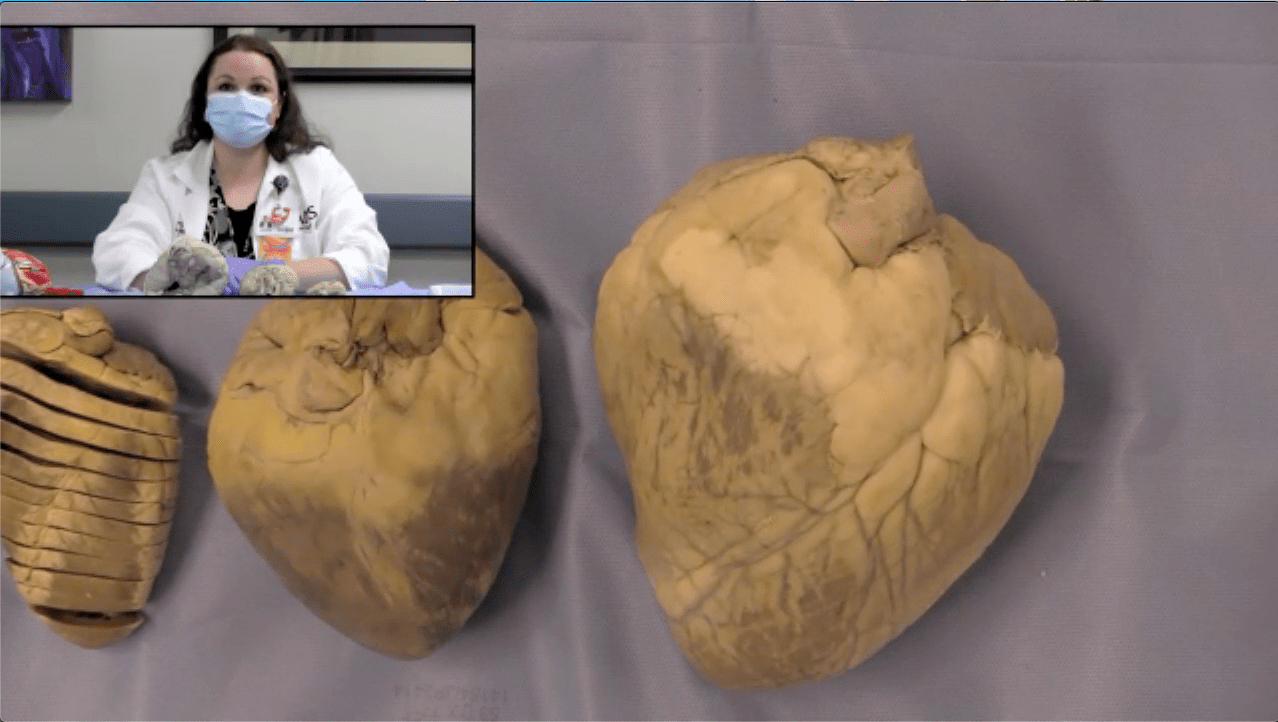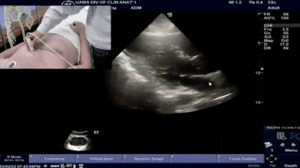UAMS Experts Teach High School Students About Medical Technology, Workings of the Heart
| University of Arkansas for Medical Sciences (UAMS) experts in technology and anatomy teamed up March 2 to take a group of high school sophomores on a virtual journey through the heart.
The 39 sophomores who participated were members of the American Heart Association’s Sweetheart Program, which for 15 years has been educating high school girls in Central Arkansas about heart disease while empowering them to be advocates for heart health and introducing them to medical research.
The UAMS ArkanSONO program taught the Sweethearts about point-of-care ultrasounds and other imaging technologies. A technology-based outreach program, the UAMS ArkanSONO program received a five-year, $1.27 million dollar Science Education Partnership Award (SEPA) grant from the National Institute of General Medical Sciences (NIGMS) in 2018 to aid in efforts to stimulate student interest in Science, Technology, Engineering and Mathematics (STEM) fields and careers.
Kevin D. Phelan, Ph.D., a UAMS anatomy professor who is the director of the ArkanSONO program, and Erica Malone, Ph.D., who recently joined UAMS as an assistant professor in the Department of Neurobiology and Developmental Sciences, set up three virtual demonstrations to educate the Sweethearts about ultrasound, heart anatomy and technological advances that provide a three-dimensional look inside the bodies of people who have undergone heart-related procedures (e.g., pacemaker implants or coronary artery bypass).

Using the SECTRA Educational Portal, Phelan shows students a CT scan of a person who had an enlarged heart.
Phelan used the SECTRA Educational Portal, a subscription-based interactive learning and teaching platform that uses advanced visualization tools and a library of real anatomy and clinical cases, to take students on a 3D tour inside a 90-year-old woman’s body that had been donated to science. Students saw that her heart had enlarged significantly over time due to hypertension. They saw where a pacemaker had been implanted to provide electrical impulses. In another case on the portal, students saw where surgeons had bypassed blocked arteries to keep blood flowing to and from the heart.
At the ultrasound station, Phelan performed a live ultrasound scan on a standardized patient while students viewed the sonogram. At a third station, Malone showed students three actual preserved hearts — from a pig, a cow and a sheep. She peeled back layers, allowing the students to see the internal structures of the heart.
“I was able to watch while Dr. Phelan did his presentations, and the students seemed very interested and engaged,” Malone said. “When he asked what they learned at the end of the session, they had great answers. They remembered things like the reason for using gel for ultrasound and the rule of thirds for viewing the heart on a radiograph. This was very impressive to us.”
Tammy Quick, co-chair of the Sweetheart program who coordinated the hour-long virtual program, said the students, as well as some of their mothers who watched alongside them from their homes, “found it very interesting.”
“Historically, this is an in-person event at UAMS,” Quick said. “We were so grateful that UAMS was willing and able to beautifully execute this virtual learning experience for both the 2022 and the 2021 Sweethearts. It exposed them to the field of medical research, which they knew nothing about. Also, we know that exposure to the medical or health field can spark a young mind to enter a profession focused on healing. It also helps them understand the mission of the American Heart Association and encourages them to support that mission.”
The NIH-sponsored ArkanSONO program previously has conducted in-person STEM outreach sessions to ninth-grade Little Rock School District students and has hosted 60 students at a time for weeklong summer day camp on the UAMS campus. Though the camp was canceled due to COVID-19 restrictions the past two years, Phelan said he is currently accepting applications for this summer’s camp.

